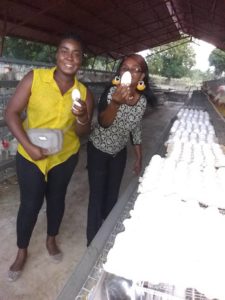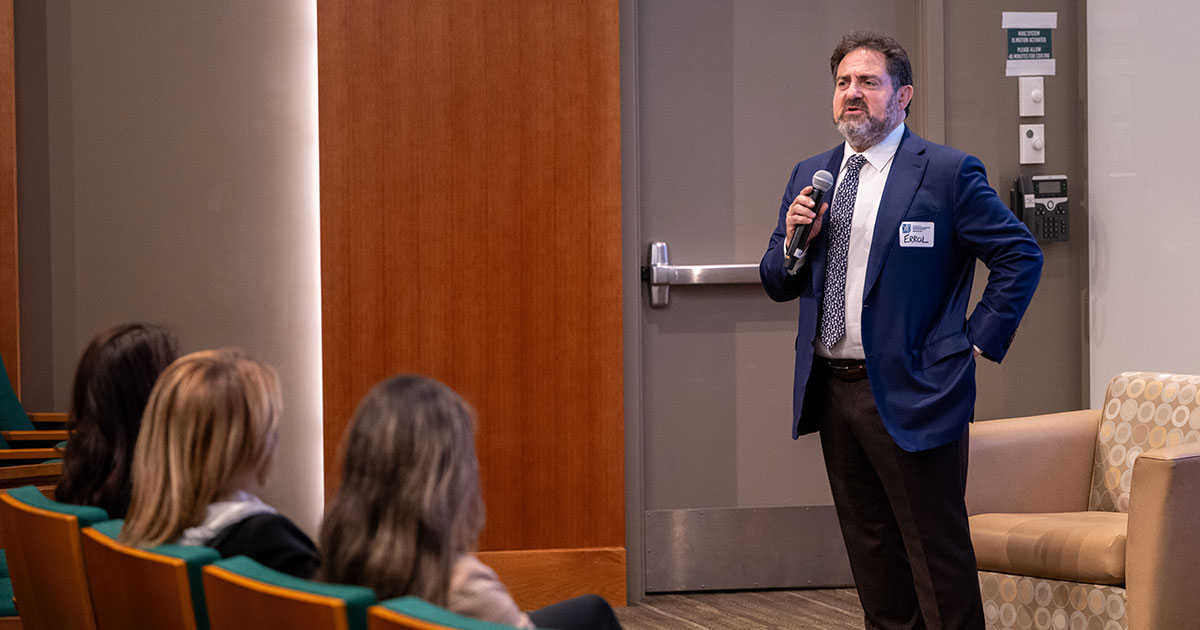Babson Grad’s Nonprofit Empowers Entrepreneurs in Haiti

Rebecca Obounou MBA’17 remembers waking up at dawn and seeing a line of sick people stretched outside her home in rural Haiti. They were there to see to her mother, Rose Roseme, a nurse who cared for people the local hospital turned away after the morning triage. Eventually, her mother opened her own clinic. She cared for the sick and also created jobs for local healthcare providers.
“I watched my mom’s venture empower women and help keep communities around us healthy,” Obounou says. “That taught me a lot about how to work with locals and be thoughtful about it.”

Rebecca Obounou MBA’17
Obounou was inspired to create Communities for Haitian Entrepreneurs and Startups (CHES) in 2008, a nonprofit that supports small business owners in rural Haiti through funding, education, and mentoring.
The work is needed, she says, because although Haiti receives a lot of international aid, it sometimes has the effect of keeping Haiti poor and dependent on outside assistance. This is because donor organizations often operate according to their own agendas and priorities without consulting the people who live there, Obounou and other Haiti advocates say. For example, the practice of “rice dumping,” where the United States flooded Haiti with subsidized rice, has been widely criticized for effectively wiping out local agriculture.
CHES has a different approach. The nonprofit goes directly to the mango growers and chicken farmers, the builders and artisans and asks them what they need. “We work with Haitian communities and homegrown Haitian entrepreneurs on the ground, honoring their needs and wants and building local capacity,” Obounou says.
Small Ventures, Big Payoffs

A poultry farm supported by CHES provides a valuable source of protein.
A chicken farm called Klèb Foumi, or “ant club”—a nod to the teamwork found in ant colonies—is providing eggs, “a cheap source of protein,” Obounou says. It also is learning to practice sustainability. Farmers collect the “excrement from the hen and it goes back into the farm,” Obounou says.
Now, CHES is fusing with another company: Navèt 1804, a rum venture co-founded by her younger brother and three friends, all of Caribbean descent. Navèt will launch its rum lines in the third quarter of 2022, and CHES will become the company’s philanthropic arm. The foundation is expected to be up and running by January 2027, and Obounou will lead the effort. Until then, Navèt 1804, which takes its name from the final year of the Haitian Revolution, is supporting Haitians both in-country and abroad with emergency relief fund through the end of December. So far, the effort has raised $12,775.
The rum will be produced in Haiti with Haitian sugar cane, a major crop, and refined and distributed in the United States, and then globally. Haiti already has a homegrown rum, Barbancourt, but Obounou says Navèt’s line will have “a different flavor profile. The craft rum sector has room for another premium brand.”
Investing in the Underfunded
The biggest challenge, Obounou says, “has been getting funders to support Haitian-run and Haitian-led enterprises. In the 14 years I’ve led CHES, it took a long time to get funding.” This is part and parcel of a larger problem, she says, in which “organizations of color are often underfunded.”
Obounou, also assistant dean of innovation at MIT, acknowledges that venture capitalists can be reluctant to invest in a country with so much poverty and unrest. Last July, Haitian President Jovenel Moïse was assassinated. The political situation in Haiti “has not helped,” Obounou says, “and it overshadows the good work Haitians are doing. There is some cleaning that needs to happen.”
“Supporting agriculture and economic stability is a way to build wealth in Haiti. Haitians are invested because it’s their home, and they want to lead dignified lives.”
Rebecca Obounou MBA’17, founder, Communities for Haitian Entrepreneurs and Startups
Obounou says the outreach she does to engage donors always revolves around a central question: “How can entrepreneurs thrive in a country like Haiti?” The Caribbean nation has been called “the poorest country in the Western Hemisphere.” Despite Haiti’s hardships and vulnerabilities, including poverty, devastating earthquakes and hurricanes, disease, and political unrest, Obounou says, “there’s a way to work together to bring about long-term change. The work is underway and it is Haitian-led. ”
“If there are the right operations and processes and funding in place, these ventures will succeed,” she says. And, they could have a domino effect. “Supporting agriculture and economic stability is a way to build wealth in Haiti,” Obounou says. “Haitians are invested because it’s their home, and they want to lead dignified lives.”



